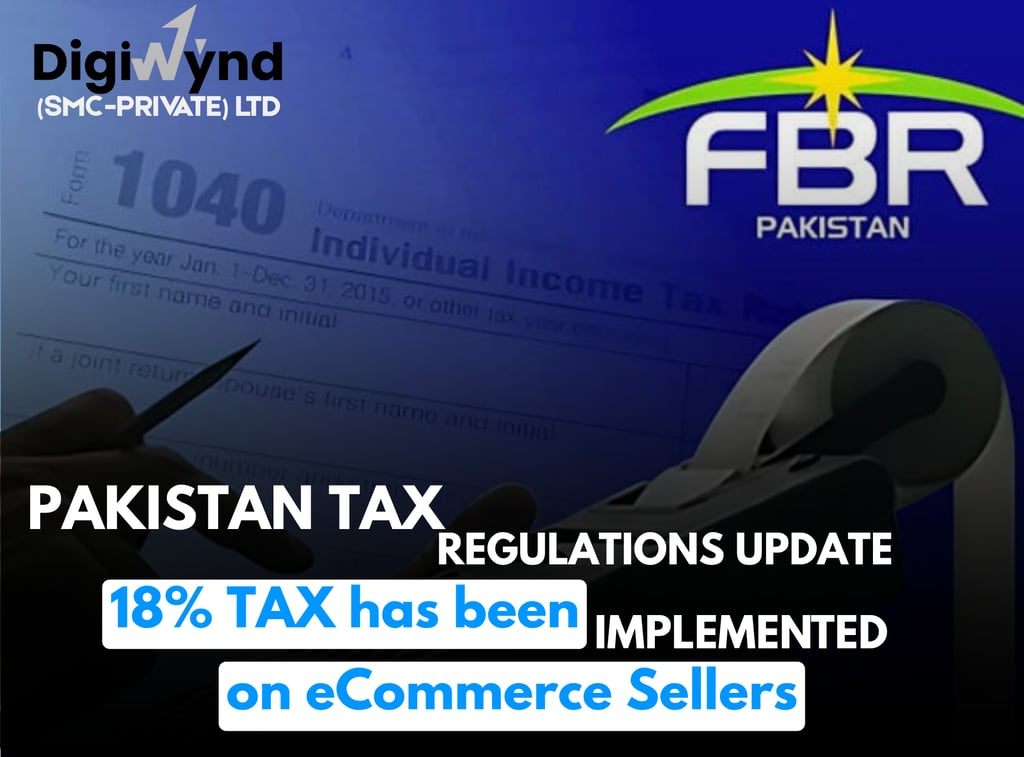New 18% Tax Impacting E-commerce Sellers in Pakistan
E-COMMERCE
DIGIWYND
6/12/20252 min read


📦 Pakistan Imposes 18% Tax – What It Means for eCommerce Sellers in 2025
In a recent move under the revised tax regulations for 2025, the Government of Pakistan has officially implemented an 18% sales tax that directly impacts the eCommerce industry and logistics sector. While tax changes are nothing new, this particular adjustment is already causing concern among eCommerce sellers, courier service providers, and small businesses that rely heavily on digital platforms and cash-on-delivery (COD) services.
🚨 What's New?
Effective immediately, an 18% General Sales Tax (GST) is now applicable on several services related to online business, including:
Courier and logistics services
COD (Cash on Delivery) transactions
Shipping charges passed on to sellers
This tax is not just applied to the end customer—it directly affects eCommerce sellers, who now have to bear additional costs on every order fulfilled via courier.
💸 How Does This Impact Sellers?
For small to mid-sized online businesses operating on thin margins, this sudden tax hike can be a serious blow. Many eCommerce sellers rely on third-party courier services to deliver orders to customers across Pakistan. Now, with the 18% GST in effect:
Courier companies are adding the tax to their service fees, which is then deducted from the seller’s payout.
For COD orders, the tax is applied to the amount collected, reducing the seller's net income.
Sellers either have to absorb the cost or increase product prices, which may lead to reduced competitiveness.
⚠️ A Step Backward for Digital Commerce?
Pakistan's eCommerce market has grown rapidly in recent years, especially after the pandemic accelerated digital adoption. However, this tax policy could slow down the progress by increasing operational costs for businesses, particularly startups, freelancers, and solo entrepreneurs who already operate on limited budgets.
While taxation is necessary for economic development, the lack of clarity and sudden implementation of this new rule has created confusion among sellers. Many businesses are now re-evaluating their pricing, profit margins, and logistics strategies in response to the change.
✅ What Can Sellers Do Now?
Here are a few practical steps for online sellers to adapt:
Communicate with your courier partners to fully understand how the 18% tax is being applied.
Review your pricing structure and consider adjusting product prices to compensate for the additional cost.
Inform your customers about any changes in shipping charges or delivery timelines.
Stay updated on FBR announcements and compliance guidelines to avoid penalties.
📣 Final Word
This tax reform comes as part of the broader push to regulate and formalize Pakistan’s growing digital economy. However, it also presents new challenges, especially for the grassroots-level sellers who form the backbone of the eCommerce ecosystem.
We at DIGIWYND (SMC-PVT) LTD will continue to monitor the situation and share updates as they become available. We stand with the seller community and understand the difficulties this change presents.
— Team DIGIWYND
